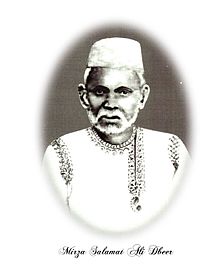Mirza Salaamat Ali Dabeer
| Mirza Salaamat Ali Dabeer | |
|---|---|
 |
|
| Born | 29 August 1803 Delhi, India |
| Died | 6 March 1875 (aged 71) Lucknow, Uttar Pradesh |
| Pen name | Dabeer |
| Occupation | Urdu poet |
| Nationality | Indian |
| Period | Mughal era |
| Genre | Marsiya |
| Subject | Battle of Karbala |
| Website | |
| www |
|
Mirza Salaamat Ali Dabeer (1803–1875) ( Urdu: مرزا سلامت علی دبیر ) was a leading Urdu poet who excelled and perfected the art of Marsiya writing. He is considered the leading exponent of Marsiya Nigari or marsiya writing along with Mir Anis.
Mirza Dabeer was born in 1803 in Delhi. He started reciting marsiya since childhood during muharram ceremonial gatherings called majalis (singular-majlis). He started writing poetry under the tutelage of Mir Muzaffar Husain Zameer. Dabeer himself was an erudite scholar of his time. He migrated from Delhi to Lucknow, where he found suitable environment to develop and demonstrate his skills in marsiya writing. According to Maulana Muhammad Husain Azad in Aab-e-Hayat quoting Tazkira-e-Sarapa Sukhan, there is confusion regarding his father's name because of two different names mentioned in Tazkira-as-Ghulam Husain /Mirza Agha Jan Kaghazfarosh. Mirza Dabeer died in Lucknow in 1875 and is buried there.
According to Muhammad Husain Azad in Aab-e-Hayat: Mirzā Sahib died on the 29th of Muharram, AH 1292 [1875–76], at the age of 72 years. In his lifetime he must have written at least three thousand elegies. Not counting his salāms and nauhas and quatrains. He wrote a dotless elegy (be-nuqta) of which the opening verse is:
Hum tale-e-Huma murad hum rasa hua
Meaning:
My far-reaching imagination has the same fortune-star as the Huma
In it, he used (the dotless) Utārid or Atarid (Mercury) instead of Dabeer for a pen-name. And there's no doubt that with him elegy composition in India reached its conclusion. Now no such time will come, nor will such accomplished persons be born (Frances W. Pritchett translation).
List of Marsiya by Dabeer:
Although Dabeer's poetic expression found expression in the genre of marsiya but he made use of other forms of Urdu poetry, viz., salaam and rubai, he seldom wrote ghazals too. A couplet from one of his salaams is a clear example of his genius comparable to Ghalib:
...
Wikipedia

